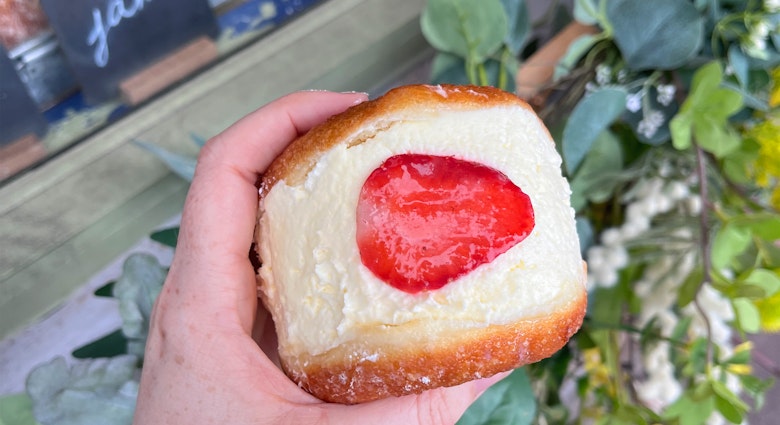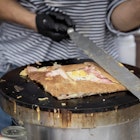
A reason to travel to Hauts-de-France in 2023: Europe’s new region of gastronomy

Nov 1, 2022 • 3 min read

Hauts-de-France, where Cape Gris-Nez is located, is home to orchards and fields that produce the lovely produce of France © Getty Images
France’s reputation for exceptional food is legendary. Now, there’s an extra incentive for gourmet travelers to book a trip for next year.
- placement: fullWidth
- path: articles/in-content-top
- possible size: [970, 250], [970, 90], [728, 90], [300, 250], [320, 50], [1, 1],
- targeting:
{ "url": "reason-to-travel-hauts-de-france", "destination": "France", "continent": "Europe", "country": "France" }
In a first for a country where the gastronomic meal has Unesco protection, Hauts-de-France (Upper, or Northern France), has been awarded the European Region of Gastronomy for 2023. Alongside producers, artisans and chefs showcasing their talents, visitors can expect activities and events, with workshops, food tours and festivals among the year’s projects zeroing in on cultural heritage, a circular economy and hyper-local, farm-to-fork sustainability.
15 best things to do in France
Set above Paris like a crown, the country’s northernmost region is home to splendid Gothic-architecture-filled cities (such as Arras, Amiens, Laon and the lively capital, Lille) and wild, windswept landscapes, as well as famously welcoming, generous inhabitants. But its food scene has often been overlooked – until now. The recognition by IGCAT (International Institute of Gastronomy, Culture, Arts and Tourism) provides an opportunity to introduce new audiences to its seasonal produce and specialties.

Orchards and fields (even marshland floating market gardens) in Hauts-de-France’s agricultural heartland grow apples, pears, leeks, carrots, cauliflowers, beetroot, artichokes and the “pearl of the north”, endives, with lush pastures producing cream (including sugar-whipped Chantilly, created at its namesake chateau) and cheeses such as Maroilles (soft cow’s milk cheese with a nutty, mushroom-like flavor), Mimolette (semi-hard, orange-colored cow’s milk cheese with a fruity aroma) and Chaud Biloute (brine-washed cow’s milk cheese typically served warm and gooey from the oven). Waters teem with seafood along the luminous blue-gray Côte d’Opale (Opal Coast), framed by chalk cliffs and home to France’s most important fishing port Boulogne-sur-Mer, landing upwards of 70 different species daily, to the vast tides and wetlands (and France’s largest saffron production) of the Baie de Somme estuary.
- placement: fullWidth
- path: articles/in-content-middle
- possible size: [970, 250], [970, 90], [728, 90], [300, 250], [320, 50], [1, 1],
- targeting:
{ "url": "reason-to-travel-hauts-de-france", "destination": "France", "continent": "Europe", "country": "France" }

Culinary influences stretch beyond its borders: Hauts-de-France adjoins the English Channel and Belgium (with Luxembourg, the Netherlands and Germany nearby), bringing distinct accents to its epicurean offerings, from its renowned beer (signature dishes from the region that incorporate it include Welsh, beer-melted cheese poured over ham on toast then grilled golden and topped with a fried egg) to irresistible sweets such as palets de dames (icing-sugar-glazed cookies), gaufres (waffles) and chocolate.
The essential guide to France’s best regions
Eat
Michelin-starred jewels crafting exquisite, cutting-edge dishes include La Table du Connetable in Chantilly, La Grenouillère in an old La Madelaine-sous-Montreuil farmhouse, La Liégeoise on the Côte d’Opale and Haut Bonheur de la Table in pretty village Cassel.

Earthier estaminets (traditional Flemish cafe/bistros with wooden tables and antiques) serve hearty favorites like carbonnade (braised beef slow-cooked with brown sugar, gingerbread and beer).
- placement: native
- path: articles/in-content-native
- possible size: [f, l],
- targeting:
{ "url": "reason-to-travel-hauts-de-france", "destination": "France", "continent": "Europe", "country": "France" }
The 10 best food experiences in France
Drink
Beer’s origins here stretch back to Celtic times. Look out for award-winning breweries including Brasserie du Pays Flamand, Brasserie Castelain and Brasserie Lilloise.
Champagne vineyards extend into Hauts-de-France’s southeast around Château-Thierry, accounting for 10% of French production.
France’s best wine regions: a guide to the finest touring routes, tastings and terroir

Stay
Lille makes an ideal base. Linked by fast trains to Paris (50 minutes), Brussels (35 minutes) and London (90 minutes), France’s fourth-largest metropolitan area has handy road and rail connections to the rest of the region, and wide-ranging accommodations, from hip hostels (like The People) to design hotels (eg L’Arbre Voyageur) and historic splendor (L'Hermitage Gantois).
- placement: fullWidth
- path: articles/bottom
- possible size: [970, 250], [970, 90], [728, 90], [300, 250], [320, 50], [1, 1],
- targeting:
{ "url": "reason-to-travel-hauts-de-france", "destination": "France", "continent": "Europe", "country": "France" }
Explore related stories





 Architecture10 things you need to do in Belgium: chocolate, comics, castles and more
Architecture10 things you need to do in Belgium: chocolate, comics, castles and moreMay 24, 2024 • 7 min read

 Festivals & EventsOktoberfest 2024 is approaching: a first-timers' guide to all merry mayhem
Festivals & EventsOktoberfest 2024 is approaching: a first-timers' guide to all merry mayhemMay 8, 2024 • 6 min read


